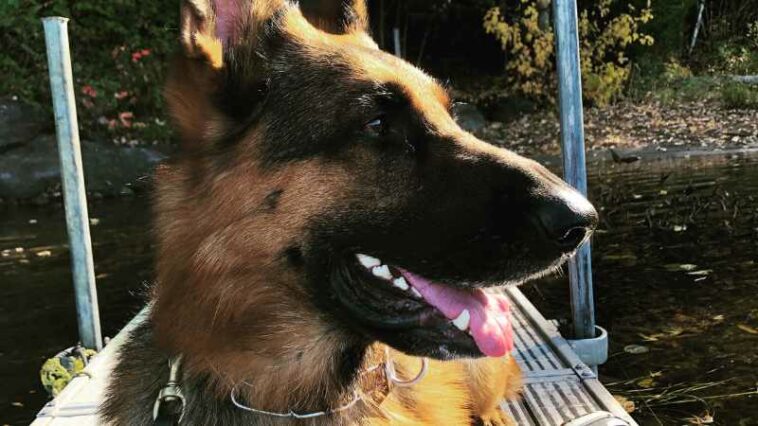When it comes to your pup’s dental health, regular check-ups and cleanings are important. You can practice good dog dental hygiene and keep their teeth healthy in between vet visits by brushing their teeth at least once a week with a toothpaste made specifically for dogs. It’s also important to provide plenty of chew toys and treats that are designed to help scrape away plaque from their teeth. By taking care of your pup’s dental health, you can ensure a healthy smile for years to come!
Basic Facts About Your Dog’s Teeth
Table of Contents
Most dogs have a total of 42 adult teeth in their mouths: 20 on the top jaw and 22 on the bottom. They have 12 incisors, 4 canines, 16 premolars, and 10 molars on each side of their mouths.
Do Dogs Have Baby Teeth?
Fun fact: Puppies typically only have 28 baby teeth! It takes around 6 months for all of their adult teeth to grow in.
You may have noticed when playing with your pup that they often like to bite or chew on your hands. This is because when puppies are young, they get their baby teeth and explore the world with them like a busy teething infant. These baby teeth usually fall out by the time your pup is six months old and all of their adult teeth grow in.
So it’s true, dogs do have baby teeth, and if you’ve had a puppy, you know how beautiful and white those puppy teeth are! Soon enough they’ll be replaced with a mouth full of healthy adult teeth. With regular check-ups and proper dental care, you can help your pup maintain a happy, healthy, and white smile for many years to come!
Do Dogs Get Cavities?
It is possible for dogs to get cavities, just like humans, and just like humans, this is usually caused by poor oral hygiene or an underlying medical condition. The most common symptoms of a cavity in dogs are bad breath and visible holes in the teeth. If you suspect your pup may have a cavity, it’s important to visit the vet as soon as possible in order to get it treated. Treatment options may include a dental cleaning, antibiotics, or even a root canal.
It’s also important to watch out for plaque build-up as this can lead to gum disease and other issues. Plaque can be removed with regular brushing and dental check-ups. Additionally, certain foods, such as those that are high in sugar, can also increase plaque build-up so it’s important to keep your pup away from these types of treats.
Are There Dentists For Dogs?
Yes, there are veterinary dentists who specialize in providing dental care for dogs and other pets. They provide a variety of dental services such as teeth cleaning, extractions, and even root canals! The American Veterinary Dental College is a resource for finding a Board Certified Veterinary Dentist near you.
We all know dogs, or have owned dogs, that never got a dental examination of this type. Depending upon the situation, however, it may be beneficial for your dog to have an annual or bi-annual dental exam. Discuss this with your veterinarian before making an appointment.
When your dog has a dental visit, it is likely that some sort of anesthesia will be used. This serves a number of important purposes:
- Keeps the dentist and technicians safe
- Avoids any pain or anxiety for your pet during the exam and procedures
- Gives the veterinarian the opportunity to thoroughly examine all of your dogs teeth and gums
- Reduces the chance of your dog inhaling any bacteria or debris resulting from the cleaning
Additionally, your vet can also provide advice on how to best care for your pup’s teeth between visits.
Practice Good Dog Oral Hygiene Habits
Why Does My Dog Have Bad Breath?
Bad breath in dogs can be caused by a variety of factors such as poor oral hygiene, dental disease, or underlying medical issues. Poor dog oral hygiene habits are one of the most common causes of bad breath and can be prevented with regular brushing and check-ups from the vet. Additionally, plaque build-up on the teeth can also lead to bad breath and should be removed with regular brushing.
Dental diseases such as periodontal disease can also lead to bad breath, so it is important to visit the vet regularly for check-ups in order to ensure your pup’s dental health is up to par. Lastly, underlying medical issues such as diabetes or kidney disease can also cause bad breath so it is important to visit the vet in order to rule out any potential medical causes.
It is also important to watch your pup’s diet as certain foods, such as those that are high in sugar, can also lead to bad breath. Taking good care of your pup’s teeth and visiting the vet regularly will help ensure a healthy smile and fresh breath for years
How Frequently Should I Brush My Dog’s Teeth?
It is recommended to brush your pup’s teeth at least three times a week. This helps remove plaque and bacteria buildup, which can lead to cavities and other dental diseases. Additionally, brushing also helps keep their gums healthy.
It is important to use toothpaste that has been specifically designed for pets as regular human toothpaste may contain ingredients that could be harmful if swallowed. (Check out the popular Arm & Hammer brand toothpaste for dogs) Use a soft-bristled toothbrush and gently brush their teeth in circular motions for about two minutes. If your pup is not used to having their teeth brushed, it is important to start slow and gradually increase the amount of brushing time until they become accustomed to the process. g ensure optimal dental health for your pup.
Are there any special treats I can give my dog to help improve their oral hygiene?
Yes! There are a variety of treats available that contain specially formulated ingredients designed to help maintain a healthy smile for your pup. Greenies are a very popular treat to remove tartar on a dogs teeth and can go a long way toward improving your dogs dental hygiene. These treats usually contain abrasive materials that help to scrub away plaque and tartar from the teeth, along with other ingredients that help freshen their breath. These treats can also provide additional vitamins and minerals to help promote overall dental health.
A word or caution: It is important to talk to your vet before introducing any new type of treat or food into your pup’s diet in order to ensure that it is safe and beneficial. This is particularly important if you have a dog with a “touchy tummy”!



